Comet
29P/Schwassmann-Wachmann
in
2011
2011/03/24
2011/03/27
2011/03/29
2011 Mar 29
|
Notice that there
is a faint
jet in P.A. 233°, which is in consistence with previous images.
|
MPC observation computed with Astrometrica
using UCAC-3 star catalog in R band:
- COD C42
OBS X.Gao, M.-T. Hui
MEA M.-T. Hui
TEL 0.36-m f/6.9 Schmidt-Cassegrain + CCD
NET UCAC-3
0029P KC2011 03 29.71752 10 49
24.99 +00 40 05.0 15.6
N C42
0029P KC2011 03 29.72457 10 49
24.84 +00 40 05.9 15.5
N C42
0029P KC2011 03 29.73144 10 49
24.67 +00 40 06.8 15.5
N C42
----- end -----
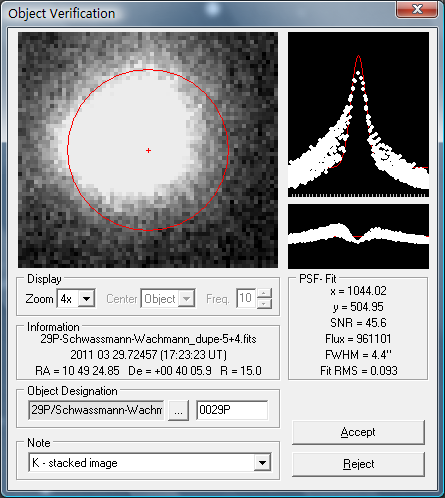
-
- Gauss curve produced by
Astrometrica with CMC-14. The total PSF is using an aperture circle of
20 x
20 pixel around the brightest
pixel. We can see the Gauss curve
in the right is as the computed ideal line and the
real pixels contributed around the ideal line. The Fit RMS,
which inlays under the Gauss curve, is the deviation from the
ideal line.
- Photometry result computed with FOCAS II,
which processes images based upon the .LOG file of Astrometrica, by means of
Multibox method:
- COD C42
CATALOG: USNO A2.0 / CMC-14 - BAND: R
10x10 20x20 30x30
40x40 50x50 60x60
SNR SB
COD
OBJECT DATE
TIME +/- +/-
+/- +/- +/- +/-
N FWHM CAT
------------ ---------- -------- -----
----- ----- -----
----- ----- ----
---- ---
29P
29/03/2011 17:23:17 14.99 13.94 13.42 13.14
12.99 12.88 44.1 19.7 C42
29P
29/03/2011 17:23:17* 0.02
0.02 0.02
0.02 0.02
0.02 3
4.2 CMC
FoCAs II - 17/03/2010
www.astrosurf.com/cometas-obs
es.groups.yahoo.com/group/Cometas_Obs
- Interpretation of the FOCAS II table
headings:
-
-
- Fisrt line:
-
- OBJECT,
DATE, TIME: refering to their original meanings respectively
-
- 10x10,
20x20 ... 60x60: the aperture sizes of photometry in term of
rectangle in arcsec that are used to measure an object's magnitude
-
- SNR:
the Signal-to-Noise Ratio for aperture photometry
-
- SB:
stars of faintest magnitude on the images used in data reduction with
the used star catalog in Astrometrica, rather than the stars of faintest
magnitude in the images
-
- COD:
MPC Code of the observatory
-
-
-
- Second line:
-
- +/-:
precisions of measurement
-
- N:
the number of used images for measurement
-
- FWHM:
Full-Width-Half-Maximum of total PSF, relevant to degree of seeing
-
- CAT:
the used star catalog in Astrometrica
-
-

Copyright © Man-To
Hui
2011/04/03
2011 Mar 27
|
The weather was
poorer than last observation of 29P on Mar. 24. |
|
A suspicious faint
jet in P.A. 231°? |
MPC observation computed with Astrometrica
using UCAC-3 star catalog in R band:
- COD C42
OBS X.Gao, M.-T. Hui
MEA M.-T. Hui
TEL 0.36-m f/6.9 Schmidt-Cassegrain + CCD
NET UCAC-3
0029P KC2011 03 27.72096 10 50
09.30 +00 35 48.2 14.7
N C42
0029P KC2011 03 27.72949 10 50
09.03 +00 35 49.4 14.8
N C42
0029P KC2011 03 27.73763 10 50
08.87 +00 35 50.3 14.8
N C42
----- end -----
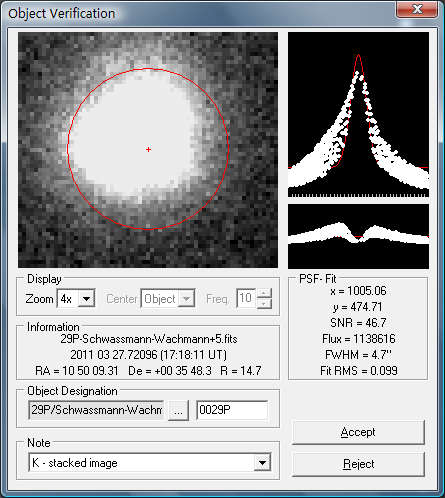
-
- Gauss curve produced by
Astrometrica with CMC-14. The total PSF is using an aperture circle of
20 x
20 pixel around the brightest
pixel. We can see the Gauss curve
in the right is as the computed ideal line and the
real pixels contributed around the ideal line. The Fit RMS,
which inlays under the Gauss curve, is the deviation from the
ideal line.
- Photometry result computed with FOCAS II,
which processes images based upon the .LOG file of Astrometrica, by means of
Multibox method:
- COD C42
CATALOG: USNO A2.0 / CMC-14 - BAND: R
10x10 20x20 30x30
40x40 50x50 60x60
SNR SB
COD
OBJECT DATE
TIME +/- +/-
+/- +/- +/- +/-
N FWHM CAT
------------ ---------- -------- -----
----- ----- -----
----- ----- ----
---- ---
29P
27/03/2011 17:30:16 14.78 13.82 13.36 13.11 12.97 12.88 31.4 18.9 C42
29P
27/03/2011 17:30:16* 0.04
0.06 0.03
0.01 0.02
0.03 3
4.3 CMC
FoCAs II - 17/03/2010
www.astrosurf.com/cometas-obs
es.groups.yahoo.com/group/Cometas_Obs
- Interpretation of the FOCAS II table
headings:
-
-
- Fisrt line:
-
- OBJECT,
DATE, TIME: refering to their original meanings respectively
-
- 10x10,
20x20 ... 60x60: the aperture sizes of photometry in term of
rectangle in arcsec that are used to measure an object's magnitude
-
- SNR:
the Signal-to-Noise Ratio for aperture photometry
-
- SB:
stars of faintest magnitude on the images used in data reduction with
the used star catalog in Astrometrica, rather than the stars of faintest
magnitude in the images
-
- COD:
MPC Code of the observatory
-
-
-
- Second line:
-
- +/-:
precisions of measurement
-
- N:
the number of used images for measurement
-
- FWHM:
Full-Width-Half-Maximum of total PSF, relevant to degree of seeing
-
- CAT:
the used star catalog in Astrometrica
-
-
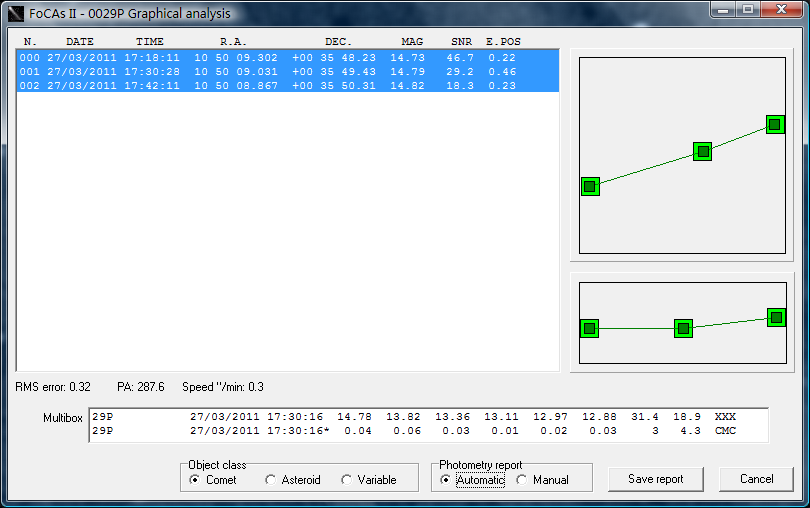
Copyright © Man-To
Hui
2011/03/27
2011 Mar 24
The bright trail
near the lower edge different in orientation from other stars is
asteroid
19698.
Click the image for a higher resolution version. |
|
Inversion version
to show the sizable coma. |
Note that the
short grey horizontal streak near the pseudonucleus is an artefact during
employment of L-S filter.
There seems
to exist a jet in P.A. 236° yet it may well be an artefact as well. 2.5x
enlarged. |
MPC observation computed with Astrometrica
using UCAC-3 star catalog in R band:
- COD C42
OBS X.Gao, M.-T. Hui
MEA M.-T. Hui
TEL 0.36-m f/6.9 Schmidt-Cassegrain + CCD
NET UCAC-3
0029P KC2011 03 24.63472 10 51
20.50 +00 29 04.9 14.6
N C42
0029P KC2011 03 24.64318 10 51
20.32 +00 29 06.3 14.6
N C42
0029P KC2011 03 24.65167 10 51
20.09 +00 29 06.8 14.7
N C42
0029P KC2011 03 24.66100 10 51
19.85 +00 29 08.3 14.6
N C42
----- end -----
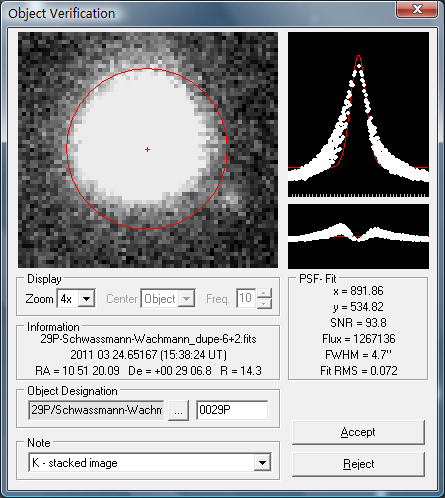
-
- Gauss curve produced by
Astrometrica with CMC-14. The total PSF is using an aperture circle of
20 x
20 pixel around the brightest
pixel. We can see the Gauss curve
in the right is as the computed ideal line and the
real pixels contributed around the ideal line. The Fit RMS,
which inlays under the Gauss curve, is the deviation from the
ideal line.
- Photometry result computed with FOCAS II,
which processes images based upon the .LOG file of Astrometrica, by means of
Multibox method:
- COD C42
CATALOG: USNO A2.0 / CMC-14 - BAND: R
10x10 20x20 30x30
40x40 50x50 60x60
SNR SB
COD
OBJECT DATE
TIME +/- +/-
+/- +/- +/- +/-
N FWHM CAT
------------ ---------- -------- -----
----- ----- -----
----- ----- ----
---- ---
29P
24/03/2011 15:32:36 14.25 13.43 13.12 12.98 12.89 12.83 91.8 19.9 C42
29P
24/03/2011 15:32:36* 0.02
0.02 0.01
0.01 0.01 0.01
4 4.3 CMC
FoCAs II - 17/03/2010
www.astrosurf.com/cometas-obs
es.groups.yahoo.com/group/Cometas_Obs
- Interpretation of the FOCAS II table
headings:
-
-
- Fisrt line:
-
- OBJECT,
DATE, TIME: refering to their original meanings respectively
-
- 10x10,
20x20 ... 60x60: the aperture sizes of photometry in term of
rectangle in arcsec that are used to measure an object's magnitude
-
- SNR:
the Signal-to-Noise Ratio for aperture photometry
-
- SB:
stars of faintest magnitude on the images used in data reduction with
the used star catalog in Astrometrica, rather than the stars of faintest
magnitude in the images
-
- COD:
MPC Code of the observatory
-
-
-
- Second line:
-
- +/-:
precisions of measurement
-
- N:
the number of used images for measurement
-
- FWHM:
Full-Width-Half-Maximum of total PSF, relevant to degree of seeing
-
- CAT:
the used star catalog in Astrometrica
-
-
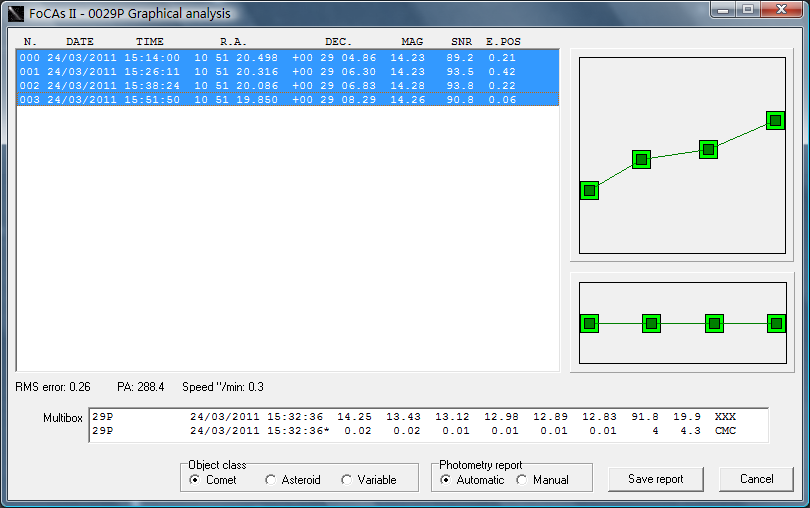
-
Copyright © Man-To
Hui
2011/03/25
Feel free to e-mail
me with any doubts or questions.
Top
Back...
-- Zurück...
Home





